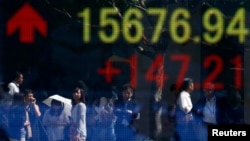BANGKOK —
Asia's financial markets rallied in buoyant trading Thursday after U.S. Federal Reserve Chairman Ben Bernanke surprised investors by announcing the Fed would continue a multibillion dollar financial stimulus program aimed at the continuing uneven performance of the U.S. economy.
The rally Thursday on Asia's financial markets sent share prices higher and was marked by a surge in currencies that sent the U.S. dollar down. Many investors had expected the U.S. Federal Reserve would follow through with plans announced earlier this year to start tapering off the $85 billion a month stimulus program.
Share prices across the region were higher with Japan's Nikkei Index setting a trend by gaining 1.8 per cent, as gains were also registered in Indonesia, India and Australia.
The U.S. dollar traded towards a seven month low against a basket of currencies as emerging Asian currencies surged in value.
Hong Kong-based Mitul Kotecha, head of global foreign exchange strategy for Credit Agricole, said markets were clearly caught off guard.
"So I think it was a positive surprise from the market perspective. Not sure it did the Fed's credibility a lot of good given that they basically - well the markets had been led to believe that one would see a tapering beginning. I still think it’s only a delay rather than a change in stance. But the bottom line is it gives the market a lot of breathing space," said Kotecha.
Emerging economies such as India had benefited as funds flowed into regions offering higher returns, especially in areas such as property. But a slowing in India's growth has also led to a sharply weaker Indian rupee in recent months.
National institute of Public Finance Policy professor. N.R. Bhanunurthy, says while the U.S. moves have offered "temporary relief" to emerging markets, the outlook remains volatile amid uncertainty over future Federal Reserve policy.
"There seems to be temporary relief in my sense, this will help the Indian financial managers to get ready for any future shocks coming from the Federal Reserve. At the moment it's very difficult for countries like India to protect themselves in this kind of volatile policy environment. My guess is that this may be the right time for central banks to intervene in the markets, particularly the foreign exchange market," said Bhanunurthy.
Shanghai, Taipei and South Korean markets are closed until the end of the week for holidays and so were unable to react to the Fed’s decision.
Market analysts say they expect the U.S. Federal Reserve to maintain the current policy over the remaining months of the year with a possible change not expected until December or early 2014.
The rally Thursday on Asia's financial markets sent share prices higher and was marked by a surge in currencies that sent the U.S. dollar down. Many investors had expected the U.S. Federal Reserve would follow through with plans announced earlier this year to start tapering off the $85 billion a month stimulus program.
Share prices across the region were higher with Japan's Nikkei Index setting a trend by gaining 1.8 per cent, as gains were also registered in Indonesia, India and Australia.
The U.S. dollar traded towards a seven month low against a basket of currencies as emerging Asian currencies surged in value.
Hong Kong-based Mitul Kotecha, head of global foreign exchange strategy for Credit Agricole, said markets were clearly caught off guard.
"So I think it was a positive surprise from the market perspective. Not sure it did the Fed's credibility a lot of good given that they basically - well the markets had been led to believe that one would see a tapering beginning. I still think it’s only a delay rather than a change in stance. But the bottom line is it gives the market a lot of breathing space," said Kotecha.
Emerging economies such as India had benefited as funds flowed into regions offering higher returns, especially in areas such as property. But a slowing in India's growth has also led to a sharply weaker Indian rupee in recent months.
National institute of Public Finance Policy professor. N.R. Bhanunurthy, says while the U.S. moves have offered "temporary relief" to emerging markets, the outlook remains volatile amid uncertainty over future Federal Reserve policy.
"There seems to be temporary relief in my sense, this will help the Indian financial managers to get ready for any future shocks coming from the Federal Reserve. At the moment it's very difficult for countries like India to protect themselves in this kind of volatile policy environment. My guess is that this may be the right time for central banks to intervene in the markets, particularly the foreign exchange market," said Bhanunurthy.
Shanghai, Taipei and South Korean markets are closed until the end of the week for holidays and so were unable to react to the Fed’s decision.
Market analysts say they expect the U.S. Federal Reserve to maintain the current policy over the remaining months of the year with a possible change not expected until December or early 2014.




